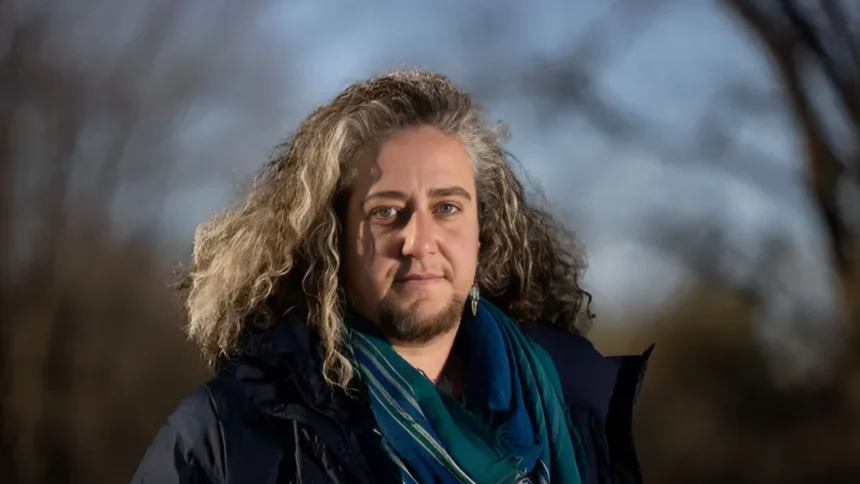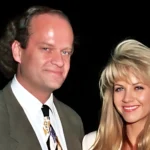Rabbi Jessica Rosenberg is famous for her dedication in social justice and community organizing within the Jewish faith. She received ordination from the Reconstructionist Rabbinical College in 2018.
She has been a strong supporter of Judaism that understands trauma as a guiding principle for its actions. This type of Judaism emphasizes understanding historical and group traumas to shape Jewish identity.
Rabbi Jessica Rosenberg helped establish the Radical Jewish Calendar project, she is part of it now too.
The Fundraiser Event and Rabbi Rosenberg’s Decision to Speak Out
Biden went to a fundraiser in Minneapolis, Minnesota. Many important Democrats from this state were present there.
The event happened in a city that has not supported a Republican for president since 1972. This makes it an important location for Biden to gather backing and show his political power.
The goal of the fundraiser was to bolster Biden’s backing in Minnesota, which is seen as being part of a regional “blue wall” in the midwestern area along with Michigan and Wisconsin.
Biden could benefit from the event by getting close to important people who support and give money, a usual aspect in these private get-togethers.
The intention of Rabbi Jessica Rosenberg to directly address President Biden during a fundraising event was motivated by her worry about the increasing violence in Gaza and immediate requirement for a ceasefire.
Rabbi Jessica Rosenberg felt an obligation to use this chance, viewing it as her duty both being a rabbi and part of Jewish community for advocating peace along with preservation of life.
She chose to put the humanitarian crisis happening in Gaza first, even though she was aware it could result in criticism or rejection from her community.
The Confrontation
At a fundraiser in Minneapolis, Rabbi Jessica Rosenberg interrupted President Biden’s speech by requesting an immediate ceasefire in the Israel-Hamas conflict.
As she got up, she said urgently: “Mr. President, if you care about Jewish people, as a rabbi myself I need you to call for a ceasefire now.”
The audience response was loud “Shhh! No! Sit down! Get out!” as security personnel started guiding her out.
Biden reacted by accepting her worries, saying he’s in favor of a “pause” to ease prisoner releases but didn’t promise an entire halt.
The conversation showed strong emotions and contrasting opinions about the conflict, with Rabbi Jessica Rosenberg’s plea finding support from those who believe it is urgent to save lives in Gaza.
Biden’s Position on the Conflict
At the Minneapolis fundraiser, President Biden talked about the Israel-Hamas conflict. He replied to Rabbi Jessica Rosenberg’s plea for a ceasefire by saying that they need a “pause” in fighting.
This suggested idea is to make time for getting back hostages held by Hamas; he presented this as something related with human rights.
It was a significant change in how Biden spoke, because before he didn’t directly say we should stop fighting now.
The difference between a “pause” and complete ceasefire received criticism. Rabbi Rosenberg and many others stated that only stopping temporarily would not be enough to avoid more innocent people getting hurt or killed in Gaza.
Public and Media Reactions
Rabbi Jessica Rosenberg’s interruption of President Biden during a fundraiser was featured in media coverage, underlining the dramatic encounter and its significance.
Reports stressed her immediate plea for ceasefire in the Israel-Hamas conflict, comparing it to Biden’s answer that suggested a “pause” to help with hostage negotiations.
Rabbi Jessica Rosenberg’s followers cheered her courage and dedication to peace advocacy, seeing her actions as an essential moral stance amidst growing violence.
Critics, who were not all non-Jews, said her interruption was wrong and could harm America’s backing for Israel.
They presented the request to stop fighting as possibly beneficial for Hamas.
Rabbi Rosenberg’s Broader Advocacy Work
Rabbi Jessica Rosenberg, in her published work *Introduction to Trauma, Healing & Resilience for Rabbis, Jewish Educators and Organizers*, she has played a major role in the discussions about trauma, healing and resilience within Jewish life.
This guide is designed to help Jewish leaders understand and deal with the effects of trauma on people and groups.
It stresses how important it is to comprehend historical as well as collective traumas which play an essential part in forming what we mean by being “Jewish”.
Rabbi Jessica Rosenberg’s method underscores the requirement for incorporating values of care, connection and systemic change into healing procedures.
She is in the process of co-authoring a book that will come out soon. The book’s name is *For Times Such as These: A Radical’s Guide to the Jewish Year*, planned to be published in 2024.
Rabbi Jessica Rosenberg’s bold confrontation of President Biden at a Minneapolis fundraiser has thrust her into the national spotlight, amplifying her voice as a leading advocate for peace and social justice within the Jewish community.
Her actions reflect a growing movement that prioritizes moral imperatives over political allegiances, challenging the status quo and demanding accountability from leaders.



